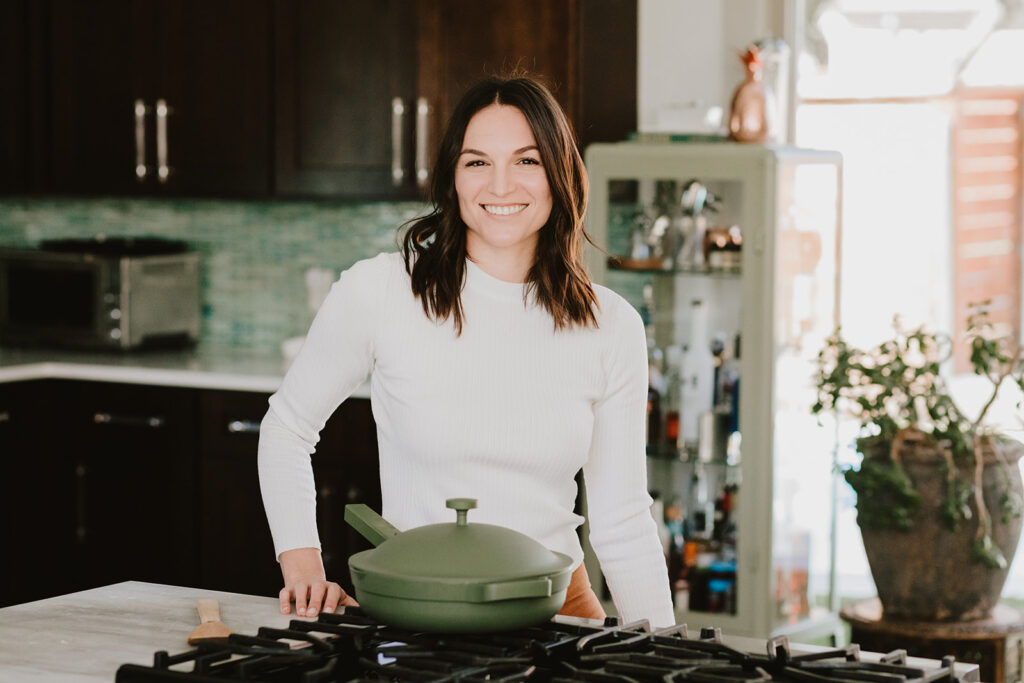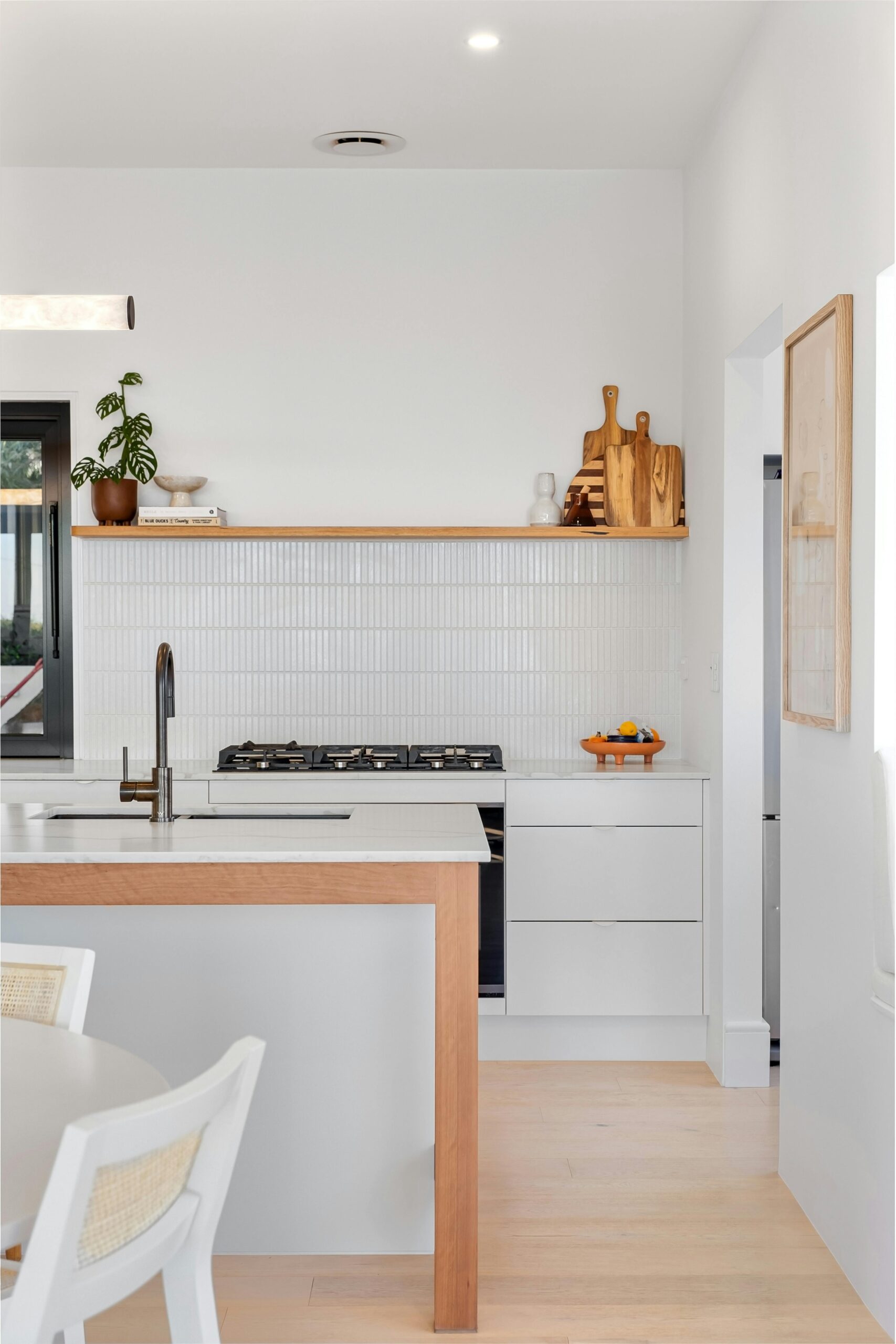I am delighted to welcome nutrition therapy & intuitive cooking expert on the blog. Meagan Rothschild is a registered dietitian and certified eating disorder specialist based in Dallas. She is the owner of Body of Knowledge Nutrition and sees clients both in-person and virtually.
She also holds a culinary nutrition certificate and recently launched an online course, Kitchen Intuition, (more on that later!) Meagan is passionate about providing inclusive, client-centered care for eating disorder recovery. She is the perfect person to have an in-depth conversation about cooking in recovery–a highly requested blog post topic!

Why do you think it is important to have basic cooking skills and knowledge when recovering from an eating disorder?
The short answer is that basic cooking skills and knowledge can be incredibly empowering and encourage autonomy in recovery.
The longer answer is that we know that eating disorders do the opposite. Cooking provides an opportunity to challenge the disordered thoughts, beliefs, and behaviors that prevent us from confidently caring for ourselves with food.
Having a general understanding of basic skills in the kitchen can actually decrease food related anxiety and the mental load of choosing what to eat several times a day, every day of the week. When we understand how to prepare a meal or specific ingredients, it can cut down on the amount of time we spend thinking about food overall and empower us to make more informed choices.
Exposure to cooking can also help us shift our thinking from numbers, rules, and rituals to a more intuitive relationship with food. Cooking encourages the use of our senses in the kitchen, increasing mindfulness around our needs and taste preferences. If a recovery goal of yours is to enjoy food again, cooking can also support this by inspiring creativity and social connection in the kitchen.
For clients who are completely new to cooking, how do you recommend they put together a meal?
I suggest picking an ingredient from each food group, (carbohydrates, protein, dietary fat, fruit/veg), to make a balanced meal, but plan on cooking only one of those ingredients. Then utilize premade, convenience, or no-cook ingredients for the rest of the meal. For example, if you want to make a burrito bowl, cook the rice, but use canned beans and/or rotisserie chicken for the protein, premade guacamole for dietary fat, and precut lettuce or pico de gallo for the veggies.
As you build confidence, cook/prep as many ingredients as you’d like, but know that there is no shame in using convenience items to cut down on prep and cook time!
Also, crockpot or sheet pan recipes can be a great way to start since all of the ingredients can be cooked together at the same time, generally with very little preparation.
A lot of people in eating disorder recovery have a difficult time cooking due to obsessive thoughts around weighing or measuring food & counting calories. Do you have any tips for them while in the kitchen?
Absolutely! This can definitely be tough since there will naturally be some degree of measuring involved in cooking and following recipes until you get more comfortable eyeballing ingredients. Here are a few tips to consider:
- Be sure to eat enough beforehand. Trying to cook when you’re hungry or haven’t met your nutrition needs can trigger even more anxiety around food numbers.
- Set an intention. Before you start cooking, think about why you’re cooking for yourself and/or others and what you’d prefer to connect with instead of numbers and measuring.
- Consider batch cooking. Instead of making one meal at a time, cook a recipe that will yield multiple servings that can be used throughout the week or frozen for later.
When you go to the grocery store, how do you prepare a list? Do you have any tips for meal planning & prepping?
I usually make a game plan for meal planning and grocery shopping in a few steps.
First, I check in with myself about what I have the time and energy for based on my schedule, social obligations, etc. This gives me a better idea of how many meals/recipes I need to shop for and encourages flexibility and self-care. Honoring our needs and preferences in a realistic way is key here – it’s obviously not going to serve you to stress or pressure yourself into cooking every meal and prepping every ingredient. I definitely do NOT recommend cooking every single meal, so I also plan to incorporate at least one premade, freezer, and/or takeout meal for more flexibility and variety.
Next, I make my list according to each section of the grocery store. Based on the layout of my neighborhood Trader Joe’s, I’ll start my list with produce, then meat/dairy, frozen items, bread and pantry items.
If you’re struggling to come up with meal ideas, it can help to have a list of meal themes to pick from each week. Here are a few examples:
Crockpot meal: chili, pot roast, chicken tortellini soup, etc.
Tex-Mex: enchiladas, tacos, fajitas, etc.
Pasta: lasagna, stuffed shells, spaghetti, etc.
Rice bowls: sushi, burrito, Mediterranean, etc.
Experiment with a prepping/cooking schedule that’s based on your anticipated energy and available time throughout the week. For example, I know Mondays are my shortest work day, so I tend to have the most energy to cook and prep other ingredients for the week. I wouldn’t recommend trying to cook your most elaborate meal on your longest or most stressful day of the week.
My last tip is to remember that perfection simply isn’t possible when it comes to cooking and meal planning. It sounds a little cheesy, but cooking is an ongoing opportunity to learn more about food and yourself. Be curious and patient as you learn, and if something doesn’t go according to plan, you can always rely on pantry staple or freezer meals (more on this below!)
What are a few go-to meals/easy staples that you consistently cook for yourself or recommend to clients?
I swear by pantry staple meals and recommend this to clients as well. This just means having a pantry stocked with items you’re familiar with that can be thrown together with minimal preparation. Some of my pantry staple meals are chickpea curry and rice, 3 bean chili, lentil sloppy joes, and puttanesca pasta. Most of which I’ve shared on my Instagram and will be on my blog (coming soon!).
Based on my taste preferences, I always have canned fish, beans, chickpeas, and tomatoes, broth, rice, pasta, dried lentils, olives, and spices stocked at all times. To make your own pantry staple list, think about items you’ll use on a weekly basis and flavors you genuinely enjoy. If you’re not sure what those are, try to include one or two new items on your grocery list each week.
Keeping enough food around can be a struggle when navigating recovery, so when possible, I encourage clients to experiment and buy more pantry staples than they think they might need in a given week since these items won’t go bad for a while.
Finally, tell us about your online course, Kitchen Intuition! Why did you create it, who is it for, and how is it set up?
I’d love to talk about Kitchen Intuition! I created this course because I believe that cooking can be one of those keys to living a full life in recovery. I think we all deserve to feel comfortable and confident in our own kitchens, where so many of our physical, emotional, and social needs can be cared for.
Cooking is certainly not required or mandatory to live a full, enjoyable life, but I really like the idea of everyone having the true autonomy to make that decision for themselves, without the interference of an eating disorder. The course combines basic cooking and Intuitive Eating skills to increase that autonomy with food and cooking choices and decrease the disordered, diet culture noise that silences our own intuition. It’s for any adult wanting to feel calmer and more confident in their kitchen and around food in general.
It’s online and self-paced so you can watch each video lesson as many times as you’d like! It also includes a recipe book and workbook that you can complete on your own, or even with your own dietitian for more support.
If you’re interested in working with Meagan or need more information, check out her website here!
Published by Merrit Elizabeth on May 6, 2024.

Merrit Elizabeth Stahle is an Eating Disorder Recovery Coach certified by The Carolyn Costin Institute. She holds a master’s degree in Health Promotion Management and a certification in Applied Neuroscience. With many years of experience, she has worked with hundreds of clients, parents, and treatment team members to support lasting recovery. Fully recovered herself, she combines professional training with lived experience to help women rebuild trust, confidence, and freedom around food and body.

read or leave a comment +
Hide Comments –